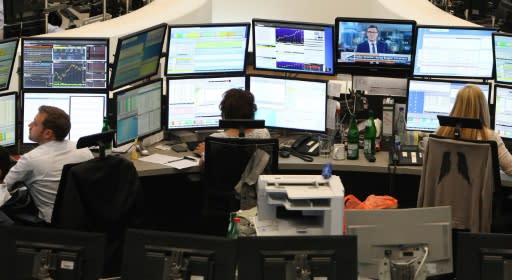European stock markets slump on China plunge

European stock markets sank on Monday as investors reacted to the biggest one-day plunge in Chinese equities in more than eight years.
Markets meanwhile awaited this week's US Federal Reserve's monetary policy meeting for a handle on its plans for interest rates.
London's benchmark FTSE 100 index of major companies slid 0.75 percent to stand at 6,530.39 points in afternoon trading.
Frankfurt's DAX 30 slumped 1.95 percent to 11,125.68 points and the CAC 40 in Paris tumbled 2.11 percent to 4,950.54 points compared with Friday's close.
"The collapse in the Chinese market is worrying for two reasons: it pulls the other markets lower due to short-term sentiment, but more importantly it sends a message that the second-largest economy in the world is starting to stall," IG analyst David Madden told AFP.
"The Chinese authorities have been doing their utmost to prop up the market but to no avail, and now after a series of sharp declines traders know the party is over."
- Worst yet to come? -
"Global equity markets have not fully factored in the Chinese meltdown, and the worst is yet to come as the Asian powerhouse slows down," said Madden.
Chinese markets suffered a second straight day of selling on increasing fears about the state of the mainland economy after a gauge of manufacturing activity fell in July to its lowest level in 15 months.
And on Monday figures showed profits at the country's industrial firms slipped 0.3 percent year-on-year in June.
Shanghai shares plunged 8.48 percent despite government efforts to prop up the market. The decline was its biggest single-day drop since February 2007, according to Bloomberg News.
Elsewhere in Asia, Hong Kong tanked 3.09 percent, Tokyo declined 0.95 percent and Seoul gave up 0.35 percent, but Sydney added 0.43 percent.
"The variety of reasons why this latest Chinese plunge has had such an effect on the markets captures the reasons why China itself is such a huge, and worrying, figure in the macro-economic landscape," said Spreadex analyst Connor Campbell.
- Dollar weak before Fed -
The dollar meanwhile remained weak after a disappointing read on the US housing market, as investors await the Federal Reserve's next monetary policy decision due on Wednesday.
In foreign exchange activity in London on Monday, the European single currency rose to $1.1098 from $1.0977 late in New York on Friday.
While the Fed is not expected to raise rates this week, dealers are hoping for some forward guidance, with most analysts tipping a hike in either September or December.
Wall Street stocks also opened lower Monday on the plunge in Chinese equity markets, with the Dow Jones Industrial Average sliding 0.84 percent to 17,420.68 points after seven minutes of trading.
The broad-based S&P 500 fell 0.68 percent to 2,065.44, while the tech-rich Nasdaq Composite Index dropped 1.04 percent to 5,035.16.
Back in London on Monday, British publisher Pearson topped the fallers after revealing Saturday that it was in talks to sell its 50-percent stake in The Economist Group.
The announcement comes just two days after Pearson agreed to sell the Financial Times to Japanese media group Nikkei for £844 million ($1.3 billion, 1.2 billion euros), saying that it wanted to focus solely on the education publishing sector which accounts for most of its business.
Shares tumbled 4.4 percent to 1,165 pence in afternoon trading.
On the upside, household goods firm Reckitt Benckiser rose as higher revenues and a brighter outlook eclipsed news of sliding first-half net profit.
Reckitt, which produces Durex condoms, household cleaner Cillit Bang, and Nurofen pain relief tablets, saw its share price gain 2.3 percent to 6,046 pence.
Meanwhile, rising sales of medical equipment helped drive a 12 percent increase in second quarter net profit at Dutch electronics manufacturer Philips to 272 million euros.
Philips shares jumped 2.9 percent to stand at 24.88 euros in afternoon trading in Amsterdam.

 Yahoo Finance
Yahoo Finance 